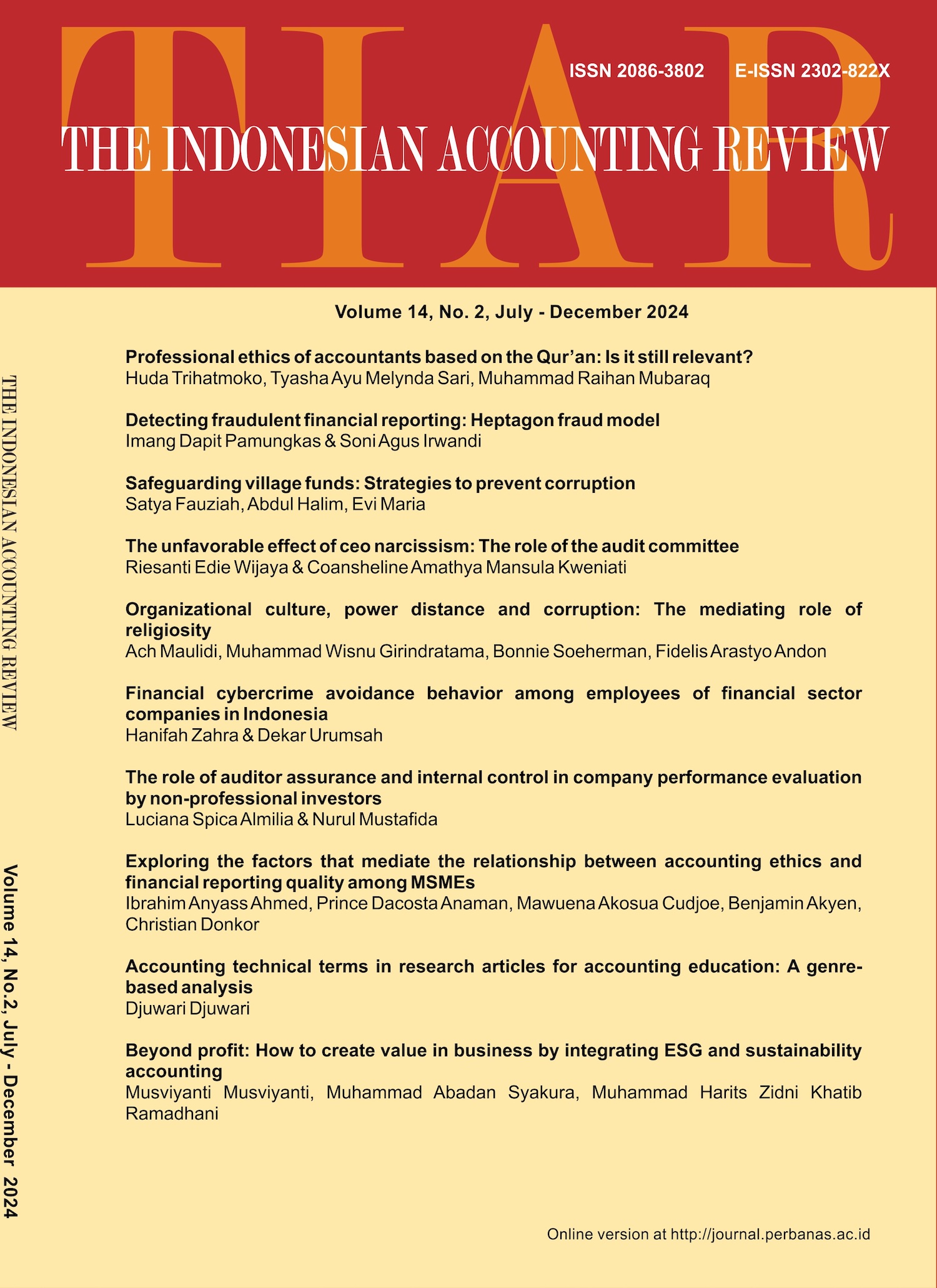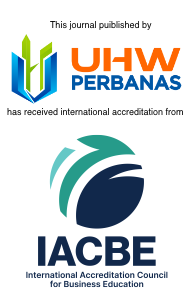The unfavorable effect of ceo narcissism: The role of the audit committee
DOI:
https://doi.org/10.14414/tiar.v14i2.4581Keywords:
CEO narcissism, Audit committee, Tax avoidanceAbstract
Narcissism is often considered a behavioral disorder that has negative im-pacts, especially for top management. The audit committee, as part of the governance system, plays a major role in suppressing such negative behav-ior. The purpose of this study is to examine the role of the audit committee in suppressing the negative impacts of CEO narcissism. This quantitative research uses secondary data obtained from the websites of manufacturing companies listed on the Indonesia Stock Exchange (IDX) for the period 2017 – 2020, consisting of 266 companies. Sampling is conducted using purpos-ive sampling method. The operational variables used in this study are CEO narcissism, audit committee, and tax avoidance. The results of this study show that CEO narcissism has a negative and significant effect on effective tax rate (ETR). In addition, the results of this study also show that the audit committee (AC) is unable to influence management decisions in car-rying out tax avoidance. The agency theory is unable to explain how the audit committee positions itself in narrowing asymmetry of information between agents and principals. On the other hand, institutional theory can explain the inability of the audit committee in carrying out its monitoring function. According to institutional theory, the existence of an audit committee in the company is merely a formality.
References
Alkurdi, A., & Mardini, G. H. (2020). The impact of ownership structure and the board of directors’ composition on tax avoidance strategies: empirical evidence from Jordan. Journal of Financial Reporting and Accounting.
Al-Shammari, M., Rasheed, A., & Al-Shammari, H. A. (2019). CEO narcissism and corporate social responsibility: does CEO narcissism affect CSR focus? Journal of Business Research, 104, 106–117.
Aluchna, M., & Kuszewski, T. (2022). Responses to corporate governance code: evidence from a longitudinal study. Review of Managerial Science, 16(6), 1945–1978.
APA. (2022). Diagnostic and statistical manual of mental disorders : DSM-5-TR / American Psychiatric Association. (5th ed.). American Psychiatric Association.
Araújo, V. C., Góis, A. D., Luca, M. M. M. De, & Lima, G. A. S. F. de. (2020). CEO narcissism and corporate tax avoidance. Revista Contabilidade & Finanças, 32, 80–94.
Arijit, & Hambrick, D. C. (2007). It’s all about me: Narcissistic chief executive officers and their effects on company strategy and performance. Administrative Science Quarterly, 52(3), 351–386.
Bachrach, D. G., Kim, K. Y., Patel, P. C., & Harms, P. D. (2022). Birds of a feather?: Firm sales growth and narcissism in the upper echelons at the CEO-TMT interface. The Leadership Quarterly, 101621.
Bahli, B., & Rivard, S. (2003). The information technology outsourcing risk: a transaction cost and agency theory-based perspective. Journal of Information Technology, 18(3), 211–221.
Basu, S. (2016). Global perspectives on e-commerce taxation law. Routledge.
Besar, M. H. A. H. (2019). Corporate Governance, Infusing Muamalah Contracts in Shareholders’ Relationship. Research in Corporate and Shari’ah Governance in the Muslim World: Theory and Practice.
Bjurstrøm, K. H. (2020). Principal–agent or principal–steward: how ministry–agency relations condition the impact of performance management in the steering of government agencies. Public Performance & Management Review, 43(5), 1053–1077.
Blair, C. A., Helland, K., & Walton, B. (2017). Leaders behaving badly: The relationship between narcissism and unethical leadership. Leadership & Organization Development Journal.
Bosse, D. A., & Phillips, R. A. (2016). Agency theory and bounded self-interest. Academy of Management Review, 41(2), 276–297.
Braun, S. (2017). Leader narcissism and outcomes in organizations: a review at multiple levels of analysis and implications for future research. Frontiers in Psychology, 8, 773.
Brown, J. L. (2016). Discussion of CEO Narcissism and Corporate Tax Sheltering. The Journal of the American Taxation Association, 38(1), 23–27.
Brown, J. L., Olsen, K. J., & Stekelberg, J. (2016). Discussion of CEO Narcissism and Corporate Tax Sheltering. The Journal of the American Taxation Association, 38(1), 1–22.
Buyl, T., Boone, C., & Wade, J. B. (2019). CEO narcissism, risk-taking, and resilience: An empirical analysis in US commercial banks. Journal of Management, 45(4), 1372–1400.
Cabitza, F. (2019). Biases affecting human decision making in AI-supported second opinion settings. International Conference on Modeling Decisions for Artificial Intelligence, 283–294.
Campbell, W. K., Hoffman, B. J., Campbell, S. M., & Marchisio, G. (2011). Narcissism in organizational contexts. Human Resource Management Review, 21(4), 268–284.
Chatterjee, A., & Hambrick, D. C. (2011). Executive personality, capability cues, and risk taking: How narcissistic CEOs react to their successes and stumbles. Administrative Science Quarterly, 56(2), 202–237.
Chaudhry, N. I., Roomi, M. A., & Aftab, I. (2020). Impact of expertise of audit committee chair and nomination committee chair on financial performance of firm. Corporate Governance: The International Journal of Business in Society.
Christine, J., Sunstein, C. R., & Thaler, R. (1998). A behavioral approach to law and economics. Stanford Law Review, 50(5), 1471–1550.
Clarke, T. (2014). The impact of financialisation on international corporate governance: the role of agency theory and maximising shareholder value. Law and Financial Markets Review, 8(1), 39–51.
Code, C. (1992). The financial aspects of corporate governance. London: The Committee on the Financial Aspects of Corporate Governance and Gee and Co. Ltd.
Conley, K., Natarajarathinam, M., Lu, W., & Rangan, S. (2019). Effect of accounting policies on effectiveness of inventory management strategies. Engineering Management Journal, 31(4), 246–256.
Das, S., Gong, J. J., & Li, S. (2022). The effects of accounting expertise of board committees on the short-and long-term consequences of financial restatements. Journal of Accounting, Auditing & Finance, 37(3), 603–632.
Davis, P. E., Bendickson, J. S., Muldoon, J., & McDowell, W. C. (2021). Agency theory utility and social entrepreneurship: issues of identity and role conflict. Review of Managerial Science, 15(8), 2299–2318.
de Almeida, N. S., & Lemes, S. (2019). Determinants of accounting choice: do CFOs’ characteristics matter? Management Research Review.
de Barros, F. E. E., dos Santos, R. C., Orso, L. E., & Sousa, A. M. R. (2021). The evolution of corporate governance and agency control: the effectiveness of mechanisms in creating value for companies with IPO on the Brazilian stock Exchange. Corporate Governance: The International Journal of Business in Society.
De Colle, S., & Bennett, A. M. (2014). State-induced, strategic, or toxic? An ethical analysis of tax avoidance practices. Business & Professional Ethics Journal, 53–82.
Deslandes, M., Fortin, A., & Landry, S. (2020). Audit committee characteristics and tax aggressiveness. Managerial Auditing Journal.
Díez-Martín, E., Díez-de-Castro, E., & Vázquez-Sánchez, A. (2018). Refocusing isomorphism to explain organizational legitimacy: A new approach. In Organizational legitimacy (pp. 23–43). Springer.
DiMaggio, P. J., & Powell, W. W. (1983). The iron cage revisited: Institutional isomorphism and collective rationality in organizational fields. American Sociological Review, 147–160.
Dodd, P., & Warner, J. B. (1983). On corporate governance: A study of proxy contests. Journal of Financial Economics, 11(1–4), 401–438.
Doo, S., & Yoon, S. (2020). Voluntary audit committees and financial reporting: Korean evidence. Asia Pacific Journal of Financial Studies, 49(5), 689–719.
Du Plessis, J. J., Hargovan, A., & Harris, J. (2018). Principles of contemporary corporate governance. Cambridge University Press.
Dyreng, S. D., Hanlon, M., & Maydew, E. L. (2010). The effects of executives on corporate tax avoidance. The Accounting Review, 85(4), 1163–1189. https://doi.org/10.2308/accr.2010.85.4.1163.
Eisenhardt, K. M. (1989a). Agency theory: An assessment and review. Academy of Management Review, 14(1), 57–74.
Eisenhardt, K. M. (1989b). Agency theory: An assessment and review. Academy of Management Review, 14(1), 57–74.
Elbadry, A., Gounopoulos, D., & Skinner, F. (2015). Governance quality and information asymmetry. Financial Markets, Institutions & Instruments, 24(2–3), 127–157.
Fama, E. F., & Jensen, M. C. (1983). Separation of ownership and control. The Journal of Law and Economics, 26(2), 301–325.
Featherston, R., Downie, L. E., Vogel, A. P., & Galvin, K. L. (2020). Decision making biases in the allied health professions: A systematic scoping review. PloS One, 15(10), e0240716.
Fitriyah, S., Makaryanawati, M., & Fauzan, S. (2020). The Effect of Corporate Governance and Financial Health on The Value of Companies Registered in Indonesia Stock Exchange. International Journal of Accounting & Finance in Asia Pasific (IJAFAP), 3(2), 77–90.
Foster, J. D., & Trimm IV, R. F. (2008). On being eager and uninhibited: Narcissism and approach–avoidance motivation. Personality and Social Psychology Bulletin, 34(7), 1004–1017.
Fukuyama, F. (2013). What is governance? Governance, 26(3), 347–368.
Galvin, B. M., Lange, D., & Ashforth, B. E. (2015). Narcissistic organizational identification: Seeing oneself as central to the organization’s identity. Academy of Management Review, 40(2), 163–181.
García-Meca, E., Ramón-Llorens, M.-C., & Martínez-Ferrero, J. (2021). Are narcissistic CEOs more tax aggressive? The moderating role of internal audit committees. Journal of Business Research, 129, 223–235.
Goldman, N. C., & Lewellen, C. M. (2020). Ethical considerations of corporate tax avoidance: Diverging perspectives from different stakeholders. In The Routledge Handbook of Accounting Ethics (pp. 258–269). Routledge.
Graham, J., Plumptre, T. W., & Amos, B. (2003). Principles for good governance in the 21st century.
Graham, J. R., Hanlon, M., & Shevlin, T. (2011). Real effects of accounting rules: Evidence from multinational firms’ investment location and profit repatriation decisions. Journal of Accounting Research, 49(1), 137–185.
Greenwood, R., Suddaby, R., & Hinings, C. R. (2002). Theorizing change: The role of professional associations in the transformation of institutionalized fields. Academy of Management Journal, 45(1), 58–80.
Ham, C., Lang, M., Seybert, N., & Wang, S. (2017). CFO narcissism and financial reporting quality. Journal of Accounting Research, 55(5), 1089–1135.
Ham, C., Seybert, N., & Wang, S. (2018). Narcissism is a bad sign: CEO signature size, investment, and performance. Review of Accounting Studies, 23(1), 234–264.
Hambrick, D. C., & Mason, P. A. (1984). Upper echelons: The organization as a reflection of its top managers. Academy of Management Review, 9(2), 193–206.
Hancock, P., Robinson, P., & Bazley, M. (2020). Contemporary Accounting: A Strategic Approach for Users 10e. Cengage AU.
Hayibor, S. (2017). Is fair treatment enough? Augmenting the fairness-based perspective on stakeholder behaviour. Journal of Business Ethics, 140(1), 43–64.
Healy, P. M., & Palepu, K. G. (2001). Information asymmetry, corporate disclosure, and the capital markets: A review of the empirical disclosure literature. Journal of Accounting and Economics, 31(1–3), 405–440.
Hindman, L. C., Walker, N. A., & Agyemang, K. J. A. (2021). Bounded rationality or bounded morality? The National Basketball Association response to COVID-19. European Sport Management Quarterly, 21(3), 333–349.
Hsu, W., Huang, Y., & Lai, G. (2019). Reserve management and audit committee characteristics: evidence from US property–liability insurance companies. Journal of Risk and Insurance, 86(4), 1019–1043.
Jacob, M., Rohlfing-Bastian, A., & Sandner, K. (2021). Why do not all firms engage in tax avoidance? Review of Managerial Science, 15(2), 459–495.
Jensen, M. C., & Meckling, W. H. (1976). Theory of the firm: Managerial behavior, agency costs and ownership structure. Journal of Financial Economics, 3(4), 305–360.
Jensen, M. C., & Smith, C. W. (2000). Stockholder, manager, and creditor interests: Applications of agency theory. Theory of the Firm, 1(1).
Jones, T. M. (1991). Ethical decision making by individuals in organizations: An issue-contingent model. Academy of Management Review, 16(2), 366–395.
Kalbers, L. P., & Fogarty, T. J. (1993). Audit committee effectiveness: An empirical investigation of the contribution of power. Auditing, 12(1), 24.
Kalbers, L. P., & Fogarty, T. J. (1998). Organizational and economic explanations of audit committee oversight. Journal of Managerial Issues, 129–150.
Kallamu, B. S., & Saat, N. A. M. (2015). Audit committee attributes and firm performance: evidence from Malaysian finance companies. Asian Review of Accounting.
Kanagaretnam, K., Lobo, G. J., & Whalen, D. J. (2007). Does good corporate governance reduce information asymmetry around quarterly earnings announcements? Journal of Accounting and Public Policy, 26(4), 497–522.
Khoo, E. S., Lim, Y., & Monroe, G. S. (2020). Audit committee members’ reputation incentives and their effectiveness in monitoring the financial reporting process. Abacus, 56(3), 348–406.
Kirchler, E. (2019). Strengthening Tax Compliance by Balancing Authorities’ Power and Trustworthiness. WU International Taxation Research Paper Series, 2019–03.
Klein, A. (2002). Audit committee, board of director characteristics, and earnings management. Journal of Accounting and Economics, 33(3), 375–400.
Kontesa, M., Brahmana, R., & Tong, A. H. H. (2021). Narcissistic CEOs and their earnings management. Journal of Management and Governance, 25(1), 223–249.
Krenn, M. (2016). Convergence and divergence in corporate governance: An integrative institutional theory perspective. Management Research Review.
Kristabel, A. J., & Wijaya, R. E. (2021). Does the Market Respond to Management Aggressiveness? AKRUAL: Jurnal Akuntansi, 13(1), 26–40.
Lee, G., & Fargher, N. L. (2018). The role of the audit committee in their oversight of whistle-blowing. Auditing: A Journal of Practice & Theory, 37(1), 167–189.
Lyle, M. R., Callen, J. L., & Elliott, R. J. (2013). Dynamic risk, accounting-based valuation and firm fundamentals. Review of Accounting Studies, 18(4), 899–929.
May, R. G., & Sundem, G. L. (1976). Research for accounting policy: an overview. The Accounting Review, 51(4), 747–763.
Mees, B., & Smith, S. A. (2019). Corporate governance reform in Australia: A new institutional approach. British Journal of Management, 30(1), 75–89.
Meyer, J. W., & Rowan, B. (1977). Institutionalized organizations: Formal structure as myth and ceremony. American Journal of Sociology, 83(2), 340–363.
Narayan, D., Chambers, R., Shah, M. K., & Petesch, P. (2000). Voices of the Poor: Crying out for Change. New York: Oxford University Press for the World Bank.
Naz, M. A., Ali, R., Rehman, R. U., & Ntim, C. G. (2022). Corporate governance, working capital management, and firm performance: Some new insights from agency theory. Managerial and Decision Economics, 43(5), 1448–1461.
Nguyen, Q. K. (2022). Audit committee effectiveness, bank efficiency and risk-taking: Evidence in ASEAN countries. Cogent Business & Management, 9(1), 2080622.
Nugroho, W., & Budiman, S. H. (2022). The Effect of Good Corporate Governance Mechanism and Firm Size on Firm Value in Property and Real Estate Sector Companies Listed on the Indonesia Stock Exchange for the 2015-2019 Period. International Journal of Accounting & Finance in Asia Pasific (IJAFAP), 5(1), 12–23.
O’Reilly III, C. A., Chatman, J. A., & Doerr, B. (2021). When “me” trumps “we”: narcissistic leaders and the cultures they create. Academy of Management Discoveries, 7(3), 419–450.
Park, B.-J., & Lee, K.-H. (2021). The sensitivity of corporate social performance to corporate financial performance: A “time-based” agency theory perspective. Australian Journal of Management, 46(2), 224–247.
Pepper, A., & Gore, J. (2015). Behavioral agency theory: New foundations for theorizing about executive compensation. Journal of Management, 41(4), 1045–1068.
Perkins, S. J., & Shortland, S. (2022). The social construction of executive pay: governance processes and institutional isomorphism. Journal of Organizational Effectiveness: People and Performance, ahead-of-print.
Plöckinger, M., Aschauer, E., Hiebl, M. R. W., & Rohatschek, R. (2016). The influence of individual executives on corporate financial reporting: A review and outlook from the perspective of upper echelons theory. Journal of Accounting Literature.
Poursoleyman, E., Joudi, S., Mansourfar, G., & Homayoun, S. (2021). The impact of corporate governance performance on the association between information asymmetry and opportunities’ optimal levels: evidence from developed markets. Journal of Economic and Administrative Sciences.
Powell, W. W., & DiMaggio, P. J. (2012). The new institutionalism in organizational analysis. University of Chicago press.
Preuss, L. (2012). CORPORATE TAX AVOIDANCE. Corporate Social Responsibility: A Research Handbook, 112.
Ragab, Y. M., & Saleh, M. A. (2021). Non-financial variables related to governance and financial distress prediction in SMEs–evidence from Egypt. Journal of Applied Accounting Research.
Rahahleh, M. H., Hamzah, A. H. Bin, & Rashid, N. (2021). Corporate Governance and Real Earnings Management: The Role of the Audit Committee Characteristics. The International Conference On Global Economic Revolutions, 293–303.
Resick, C. J., Whitman, D. S., Weingarden, S. M., & Hiller, N. J. (2009). The bright-side and the dark-side of CEO personality: examining core self-evaluations, narcissism, transformational leadership, and strategic influence. Journal of Applied Psychology, 94(6), 1365.
Riguen, R., Salhi, B., & Jarboui, A. (2020). Do women in board represent less corporate tax avoidance? A moderation analysis. International Journal of Sociology and Social Policy.
Roberts, G. H. (2004). Convergent capitalisms? The internationalisation of financial markets and the 2002 Russian corporate governance code. Europe-Asia Studies, 56(8), 1235–1248.
Roberts, J. (2001). Trust and control in Anglo-American systems of corporate governance: The individualizing and socializing effects of processes of accountability. Human Relations, 54(12), 1547–1572.
Sailendra, S., Murwaningsari, E., Mayangsari, S., & Murtanto, M. (2020). The Moderating Effect of Benevolence on the influence of Corporate Governance on Audit Quality. International Journal of Applied Business and International Management (IJABIM), 5(1), 1–11.
Saka, C., Oshika, T., & Jimichi, M. (2019). Visualization of tax avoidance and tax rate convergence: exploratory analysis of world-scale accounting data. Meditari Accountancy Research, 27(5), 695–724.
Salehi, M., Naeini, A. A. A., & Rouhi, S. (2020). The relationship between managers’ narcissism and overconfidence on corporate risk-taking. The TQM Journal.
Shackelford, D. A., & Shevlin, T. (2001). Empirical tax research in accounting. Journal of Accounting and Economics, 31(1–3), 321–387.
Shapiro, S. P. (2005). Agency theory. Annual Review of Sociology, 263–284.
She, Z., Li, Q., London, M., Yang, B., & Yang, B. (2020). Effects of CEO narcissism on decision-making comprehensiveness and speed. Journal of Managerial Psychology.
Shleifer, A., & Vishny, R. (1997). A Survey of Corporate Governance, the journal of Finance, Vol. The Journal of Finance, 52(2), 737–783.
Smith, A. (1937). The wealth of nations [1776] (Vol. 11937). na.
Spira, L. F. (2007). The audit committee: performing corporate governance. Springer Science & Business Media.
Spremann, K. (1987). Agency theory and risk sharing. Agency Theory, Information and Incentives; Hrsg. von Bamberg, Günther; Spremann, Klaus, 3–37.
Stiles, P., & Taylor, B. (1993). Benchmarking corporate governance: The impact of the Cadbury Code. Long Range Planning, 26(5), 61–71.
Sumajow, K. C., Kalangi, L., & Weku, P. (2022). The Effect of Financial Distress, Audit Committee, Auditor Switching, and Industry Types on Audit Delay in the Covid-19 Pandemic of Companies Listed on the Indonesian Stock Exchange’s KOMPAS100 Index. International Journal of Accounting & Finance in Asia Pasific (IJAFAP), 5(1), 1–11.
Tariq, Y. Bin, Ejaz, A., & Bashir, M. F. (2022). Convergence and compliance of corporate governance codes: a study of 11 Asian emerging economies. Corporate Governance: The International Journal of Business in Society, ahead-of-print.
Tax Justice Network. (2020). The State of Tax Justice 2020: Tax Justice in the time of COVID-19 . https://taxjustice.net/wp-content/uploads/2020/11/The_State_of_Tax_Justice_2020_ENGLISH.pdf
Thiel, S. van, van Genugten, M. L., & Voorn, B. (2020). Principals and agents: The relationship between governments and state-owned enterprises. Bernier, L.; Bance, P.; Florio, M.(Ed.), The Routledge Handbook of State-Owned Enterprises.
Velte, P. (2021). The link between corporate governance and corporate financial misconduct. A review of archival studies and implications for future research. Management Review Quarterly, 1–59.
Wales, W. J., Patel, P. C., & Lumpkin, G. T. (2013). In pursuit of greatness: CEO narcissism, entrepreneurial orientation, and firm performance variance. Journal of Management Studies, 50(6), 1041–1069.
Wallace, H. M., & Baumeister, R. F. (2002). The performance of narcissists rises and falls with perceived opportunity for glory. Journal of Personality and Social Psychology, 82(5), 819.
Xie, B., Davidson III, W. N., & DaDalt, P. J. (2003). Earnings management and corporate governance: the role of the board and the audit committee. Journal of Corporate Finance, 9(3), 295–316.
Yuliastuti, I. A. N., & Tandio, D. R. (2020). Leadership style on organizational culture and good corporate governance. International Journal of Applied Business and International Management (IJABIM), 5(1), 23–33.
Zengin-Karaibrahimoglu, Y., Emanuels, J., Gold, A., & Wallage, P. (2021). Audit committee strength and auditors’ risk assessments: The moderating role of CEO narcissism. International Journal of Auditing, 25(3), 661–674.
Zhong, C.-B. (2007). The ethical dangers of rational decision making. Northwestern University.
Downloads
Submitted
Published
How to Cite
Issue
Section
License
Copyright (c) 2025 The Indonesian Accounting Review

This work is licensed under a Creative Commons Attribution-NonCommercial 4.0 International License.

















